Sue Palmer
Sometimes, when you’re in the middle of an argument, you decide there’s no point going on shouting – the other side isn’t going to back down. Upstart came to that conclusion in the summer of 2019, about our disagreement with the Scottish government on the subject of the P1 tests.
The story so far
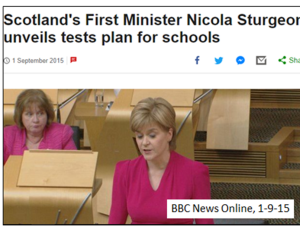 Ever since the introduction of Scottish National Standardised Assessments (SNSAs) in literacy and numeracy was announced in September 2015, Upstart had been trying to convince the government that such an assessment is not appropriate in Primary 1. We wrote a long evidence-based report and invited government MSPs to its launch (none came), we attended meetings and asked questions, and we wrote letters to and articles for the Scottish press.
Ever since the introduction of Scottish National Standardised Assessments (SNSAs) in literacy and numeracy was announced in September 2015, Upstart had been trying to convince the government that such an assessment is not appropriate in Primary 1. We wrote a long evidence-based report and invited government MSPs to its launch (none came), we attended meetings and asked questions, and we wrote letters to and articles for the Scottish press.
By early 2018, the media had started to pay attention to our arguments but the government had not. So we tried to attract their attention with a national campaign. All over Scotland, Upstart supporters chalked ‘Play Not Tests 4 P1’ near local landmarks. Another supporter funded us to make an animated film explaining why the policy was flawed. Yet another funded production of 10,000 postcards for parents to hand to head teachers, opting their children out of the P1 tests.
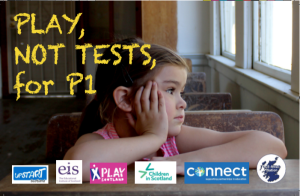 By this time, the opposition parties had scented blood. The Greens already supported Upstart’s aims but now, one by one, all the other opposition parties climbed on the Play Not Tests bandwagon and called a debate in the Scottish Parliament to scrap the tests. They won it, by 63 votes to 61. The arguments couldn’t be ignored any more… or could they?
By this time, the opposition parties had scented blood. The Greens already supported Upstart’s aims but now, one by one, all the other opposition parties climbed on the Play Not Tests bandwagon and called a debate in the Scottish Parliament to scrap the tests. They won it, by 63 votes to 61. The arguments couldn’t be ignored any more… or could they?
The traditional route for governments in these circumstances is to kick the troublesome issue into the long grass, which they did, announcing an ‘independent review’ in 2019. The Parliament’s Education and Skills Committee also launched a review. So Upstart settled down to produce written evidence for the Committee and a detailed submission to what became known as the Reedy Review, which reported in 2018.
Realising the Ambition …
 What became clear as the argument rumbled on was that nothing Upstart could say was going to influence the government’s position. The Scottish National Standardised Assessments (SNSAs) are part of a flagship policy in which there has been huge financial and political investment so even if we prove conclusively that starting them at P1 is developmentally-inappropriate and potentially damaging (indeed counter-productive) they’ve got to the stage that they can’t back down.
What became clear as the argument rumbled on was that nothing Upstart could say was going to influence the government’s position. The Scottish National Standardised Assessments (SNSAs) are part of a flagship policy in which there has been huge financial and political investment so even if we prove conclusively that starting them at P1 is developmentally-inappropriate and potentially damaging (indeed counter-productive) they’ve got to the stage that they can’t back down.
We knew Upstart’s submission to Professor Reedy had fallen on deaf ears because, when I gave oral evidence, he said that much of my argument (such as the evidence that teachers and nursery practitioners feel pressurised to ‘teach to the tests’) fell ‘outside his remit’. So when his Review reported in the government’s favour, we decided to withdraw gracefully and redirect our energies back to our core purpose of achieving a kindergarten stage for three- to seven-year-olds.
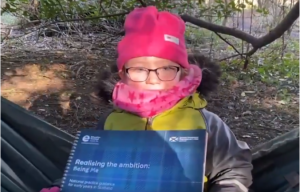 There was much to celebrate since Upstart’s launch – the huge expansion of outdoor play provision in nursery settings, the growing enthusiasm of many P1 and P2 teachers for play-based pedagogy and real progress in some local authorities in establishing developmentally-appropriate provision in P1 classes. And then, in February 2020, Education Scotland published new practice guidance for early years – Realising the Ambition: Being Me – a truly amazing document, recommending play-based pedagogy to the end of Curriculum for Excellence’s Early Level (i.e. P1/2).
There was much to celebrate since Upstart’s launch – the huge expansion of outdoor play provision in nursery settings, the growing enthusiasm of many P1 and P2 teachers for play-based pedagogy and real progress in some local authorities in establishing developmentally-appropriate provision in P1 classes. And then, in February 2020, Education Scotland published new practice guidance for early years – Realising the Ambition: Being Me – a truly amazing document, recommending play-based pedagogy to the end of Curriculum for Excellence’s Early Level (i.e. P1/2).
This truly was a great step forward in realising Upstart’s ambition. Suddenly, the P1 tests started to look like an irritating stumbling block, which must surely one day be swept out of the way. There was now authoritative national guidance, based firmly in developmental science, for early years professionals at all levels.
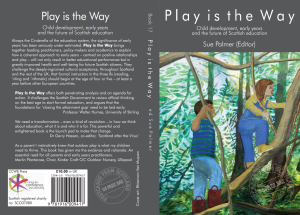 When the COVID pandemic put paid to organising meetings to promote Realising the Ambition, we decided to put our time into producing a book, Play is the Way: child development, early years and the future of Scottish education. Since its publication at the end of October 2020, it has proved enormously popular and we started to have dreams of Scotland leading the way internationally towards relationship-centred, play-based pedagogy for all three- to seven-year-olds everywhere!
When the COVID pandemic put paid to organising meetings to promote Realising the Ambition, we decided to put our time into producing a book, Play is the Way: child development, early years and the future of Scottish education. Since its publication at the end of October 2020, it has proved enormously popular and we started to have dreams of Scotland leading the way internationally towards relationship-centred, play-based pedagogy for all three- to seven-year-olds everywhere!
New variants of everything
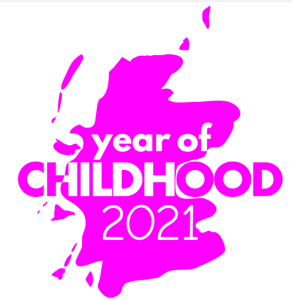 What’s more, Scotland was preparing to incorporate the United Nations Convention on the Rights of the Child into Scots law. Very few countries have done this so far (mostly Nordic countries where childhood well-being is seen as critical to national policy) and the Scottish Government has designated 2021 the Year of Childhood in celebration.
What’s more, Scotland was preparing to incorporate the United Nations Convention on the Rights of the Child into Scots law. Very few countries have done this so far (mostly Nordic countries where childhood well-being is seen as critical to national policy) and the Scottish Government has designated 2021 the Year of Childhood in celebration.
Unfortunately, 2021 also turned out to be the Year of New Variant COVID, so once again we were plunged into lockdown. And this time, there was clear evidence that the pandemic was affecting children’s mental health – P1 children (who had been locked down during what should have been their last term in nursery, and whose first term in school was all about ‘social distancing’, ‘bubbles’ and ‘infection control’) seemed to be particularly badly affected.
So it was a terrible shock, on the first day of Child Mental Health Week, to receive news that – when P1 children return to school at the end of February, they will be expected to sit the P1 SNSA. We had hoped that, like England, Scotland would abandon primary testing in this pandemic year… but no. Apparently, the collection of test data is apparently of paramount concern, even though international experts have explained that, for five-year-olds, any information collected is unreliable.
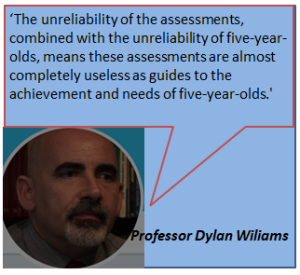 So, we’re back on the old Play Not Tests for P1 trail again…. Trying to explain that for this cohort of P1s – more even than ever before – schools have to focus on play, health, well-being and overall development. And that subjecting five-year-olds to the stress of lengthy assessments in literacy and numeracy skills will not only distract teachers from developmentally-appropriate practice, but will add to the damaging effects of the pandemic on young children’s mental health and well-being.
So, we’re back on the old Play Not Tests for P1 trail again…. Trying to explain that for this cohort of P1s – more even than ever before – schools have to focus on play, health, well-being and overall development. And that subjecting five-year-olds to the stress of lengthy assessments in literacy and numeracy skills will not only distract teachers from developmentally-appropriate practice, but will add to the damaging effects of the pandemic on young children’s mental health and well-being.
Our last blog urged Scotland to ‘build back UPWARDS’, starting from where children are and just need time, space and caring adult support to have the confidence to Be Me…
OK, deep breath, folks… onwards and upwards!

